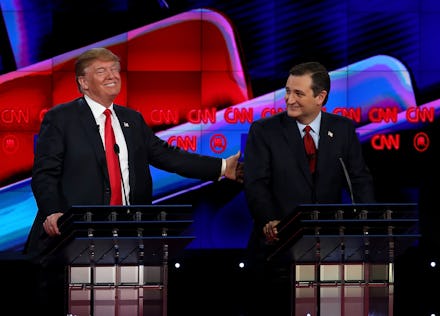3 Charts That Should Have the Republican Establishment Panicking

Four days before Christmas and just six weeks ahead of the Iowa caucuses, the Republican presidential race looks a lot like it did late this summer: Real estate mogul Donald Trump dominates most state and national polls, with other "outsider" candidates making waves of their own and establishment Republicans struggling to assert control of their party.
To be sure, the state of play is hardly identical to where it stood a few months ago. While retired neurosurgeon Ben Carson once threatened to dislodge Trump from his position atop the polls, Carson has faded amid mounting doubts about his foreign policy acumen and the surge of Sen. Ted Cruz of Texas, who now leads in Iowa and sits at second place nationally.
It wasn't supposed to be this way. The conventional wisdom held that the Summer of Trump would soon give way to the immutable laws of political gravity, with The Donald either self-imploding or entering a gradual decline and an establishment Republican (Marco Rubio? John Kasich? Jeb Bush?) moving inexorably toward the nomination, just as Mitt Romney held off the restive right in 2012.
Instead, we're poised to ring in the new year with Trump in an even stronger polling position than he was late this summer, and with his chief rival being, not a tribune of the political class, but a Tea Party favorite whose scorched-earth tactics have earned him the enmity of Washington Republicans.
This time, it seems, may really be different.
To get a sense of the magnitude of the political earthquake convulsing the Republican Party, take a look at a new batch of Iowa, New Hampshire and South Carolina polls from CBS News and YouGov. In each state, Trump, Cruz and Carson — the candidates who've most laid claim to the "outsider" mantle, and who have a combined total of three years' experience in elected office — together receive a solid majority of the vote.
Iowa
The numbers dovetail with other recent surveys that have shown Cruz moving into a lead in the Hawkeye State. CBS News/YouGov finds Cruz winning 40% support, followed by Trump at 31%, Rubio at 12% and Carson at 6%. Bush, Rand Paul, Carly Fiorina and Mike Huckabee received 2% each, while Chris Christie, Kasich and Rick Santorum each garnered just 1% support.
That makes for 77% of Iowa Republicans who back Trump, Cruz or Carson, compared to just 23% who expressed support for other candidates:
New Hampshire
The electorate in the Granite State's GOP primary is less conservative than Iowa's — Republicans in New Hampshire tend to be more moderate, and independents are allowed to vote in New Hampshire's primary, while only Republicans can participate in Iowa's GOP caucuses.
That's made the state fertile ground for center-right candidates like Sen. John McCain of Arizona, who won there in 2000 and 2008, and Romney, the 2012 victor. It's also why establishment-oriented candidates like Bush, Rubio, Kasich and Christie are counting on strong showings there.
But even in New Hampshire, a combined 51% support Trump, Cruz or Carson, according to the CBS News/YouGov survey. Trump dominates with 32% of the vote, followed by Cruz at 14%, Rubio at 13%, Christie at 11%, Kasich at 8% and Bush at 6%. Carson and Paul each nab 5%, while Fiorina comes in at 4% support.
South Carolina
From 1980 to 2008, every eventual GOP nominee notched a win in the Palmetto State primary. Newt Gingrich ended that streak in 2012, winning the state but losing the nomination to Romney. But because the state's Republican electorate is heavy on crucial Republican constituencies — including Christian conservatives and military veterans — it remains a useful gauge of the GOP mood.
And in a year filled with anti-establishment fervor, South Carolina is looking favorably upon outsider candidates. Trump, Cruz and Carson together win 70% of the vote, the CBS News/YouGov poll finds: Trump leads with 38%, trailed by Cruz at 23%, Rubio at 12%, Carson at 9%, Bush at 7%, Paul at 4% and Kasich at 2%. One percent went to each of Christie, Fiorina, Huckabee and Lindsey Graham, the state's senior United States senator, who suspended his bid on Monday.
Where does it go from here? If the GOP establishment hopes to head off a Trump or Cruz victory, its best bet is to coalesce behind an alternative ASAP.
That's just not happening.
The New Hampshire results — with establishmentarians Rubio, Christie, Kasich and Bush all clustered in the mid-single digits to low teens — underscore the traditional GOP disunity. And though Rubio has been tipped for months to emerge as the establishment choice, Christie, buoyed by an influential newspaper endorsement and an increased focus on national security issues, may yet overtake Rubio in the Granite State. Should Christie finish ahead of Rubio in New Hampshire, it will become even harder for mainstream Republicans to settle on a consensus alternative to the Trump/Cruz faction.
For the GOP establishment, this is crunch time.